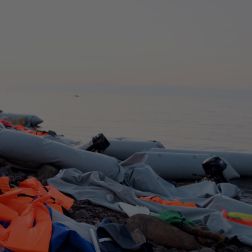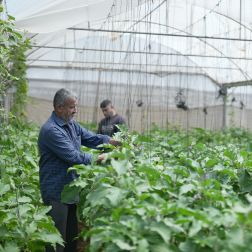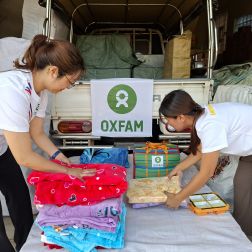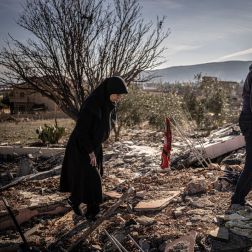- 5 mins read time
- Published: 24th August 2016
Aleppo – voices from the ground
Cut off from supplies and heavily bombarded, the people of in the Syrian city of Aleppo have borne the brunt of the fighting and have suffered far too much and too long in this bloody conflict. Since the end of July, when the fighting intensified in the city, there have been reports of attacks on schools and hospitals from the air and indiscriminate shelling and bombardment of civilian areas. Hundreds of people, including many children, have reportedly been killed. The city, which is divided in two parts (the West side of the city is under control of the government and the East side is under control of the opposition) has seen its main supply routes blocked by warring parties and thousands of civilians are cut off from food, water, and health care. Since the encirclement of the eastern part of Aleppo by pro-government forces and its allies at the end of July, and the counter-attack by armed opposition groups, little to no aid has reached hundreds of thousands of people in need. The situation is harrowing, with the recent battles pushing already vulnerable people to the brink.
DAILY STRUGGLE
“Just when you think the situation might improve, something new happens,” says Amjad*, a 33-year-old taxi driver who lives with his mother in West Aleppo. He spends most of his time driving around the city. “We got used to the destruction, the scene of people filling in jerry cans, and children carrying jerry cans heavier than them”. Samah*, a 12-year-old girl, recently fled with her family from rural Aleppo, looking for safety and shelter in the city. Samah says: “I used to go to school, but now every day I go to collect water for my family. It’s easy to carry the jerry cans if they are empty, but it’s hard when they are filled with water.” Faisal* (65) lives with his wife in their home in West Aleppo. Faisal has lived in his neighbourhood for more than 30 years, and never had to buy water. He says: “I miss those days when we used to open the tap and get as much water as we wanted. The first thing you lose when you don’t have water is your dignity”. Faisal has two sons who left Syria. Instead of having water delivered to his home at a cost, Faisal walks two kilometres each day to fill half a jerry can. With his back pain and the distance, he can’t carry more than 10 litres of water. “It is a daily struggle, but I have no other option. Our building is empty, all the neighbours left. I have to make this journey every day.” Nada* (23) has three sons and lives with her relatives in East Aleppo. When her husband died in 2013, she wanted to reduce her expenses and she moved in with her relatives. Now five families share two rooms. “I am a desperate woman who took a desperate measure, but I had no choice,” says Nada. Amina* was also displaced inside East Aleppo, and moved with her daughter and two sons to her relatives’ house. Amina says: “I am tired. The only thing I have is the clothes I am wearing. Everything is expensive, cooking is a struggle, showering is a struggle. Everything is a struggle. There’s no electricity, I have no income, no skills and I can’t support my children and that’s frustrating. I can’t ask my poor relatives for support. We are all waiting for things to get better. We are waiting without hope.” Dibeh* (27) has three children and lives with her family in a in a basement with two other families who have been displaced inside Aleppo. “I lost hope, and I feel that things will never improve,” says Dibeh. “I don’t have money and I lost everything. I can’t afford a jerry can. I would prefer to pay rent, buy milk and nappies for my two-year-old son. My husband is not working anymore and we have no income at all. We were filling water in old bottles and buckets. We are eating less and less food every day to save some money because things are getting worse.”  Children in West Aleppo fill jerry cans from a truck. Both sides of the divided city have been suffering from water cuts, since the fighting intensified at the end of July. Power cuts and damage to the infrastructure have meant that more than 1.6 million people have little to no access to the water system. Alternative solutions are local wells, and water trucking. All photos: Oxfam
Children in West Aleppo fill jerry cans from a truck. Both sides of the divided city have been suffering from water cuts, since the fighting intensified at the end of July. Power cuts and damage to the infrastructure have meant that more than 1.6 million people have little to no access to the water system. Alternative solutions are local wells, and water trucking. All photos: Oxfam  Syrians who have been displaced by the fighting in Aleppo camp in a park in the Western side of the city, under government control. Thousands of civilians have taken shelter in parks, mosques, and schools on both sides of the city as the conflict rages on. Their humanitarian needs are increasing as food prices have increased, and access to healthcare and water is becoming more difficult. Photo: Oxfam
Syrians who have been displaced by the fighting in Aleppo camp in a park in the Western side of the city, under government control. Thousands of civilians have taken shelter in parks, mosques, and schools on both sides of the city as the conflict rages on. Their humanitarian needs are increasing as food prices have increased, and access to healthcare and water is becoming more difficult. Photo: Oxfam
WHAT OXFAM IS DOING IN ALEPPO
Oxfam is helping to provide clean water across battle lines in eastern and western Aleppo as well as elsewhere in Syria. Oxfam is making available goods such as family hygiene kits, jerry cans, water tanks, water filters, chlorine tablets, and water testing kits for planned UN convoys out of Damascus and we hope that the proposed 48 hour ceasefire will allow delivery into Aleppo. A generator intended to ensure that water is pumped to the city, even when power supplies are cut off, has only been able to operate irregularly due to fuel shortages and engineers have been unable to carry out essential repairs to the water infrastructure due to the fighting. We have people on the ground in Aleppo who are trying to assess and meet the needs of water infrastructure and of water, sanitation and hygiene needs for displaced people – but until there is a cessation of fighting in the area, insecurity and lack of access make that very difficult.
CEASEFIRE
While a proposed 48 hour ceasefire in Aleppo is welcome, it must not be a one-off. A fully-fledged sustained ceasefire in the conflict is necessary to get desperately-needed humanitarian aid into all areas of Aleppo; to deal with the scale of the suffering, devastation and destruction in the city; to ensure that essential repairs to the water and power supplies can be carried out; and to ensure the protection of civilians. Such a ceasefire is needed not just in Aleppo but also across all of Syria. Somehow, the conflict needs to be de-escalated by all parties and there must be an end to indiscriminate attacks or deliberate attacks on civilians and civilian infrastructure. * All names have been changed to protect identities.




